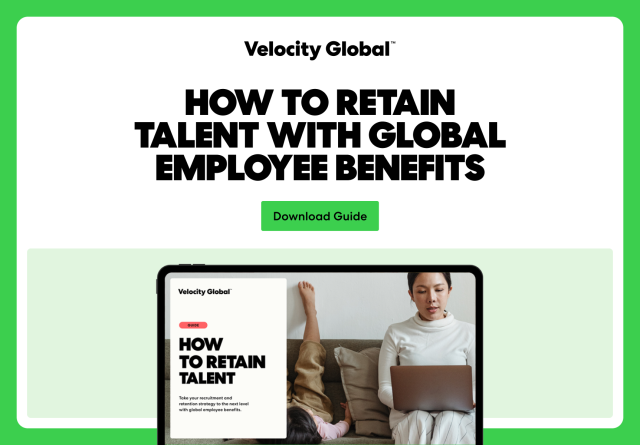Brazil is a notable player in today’s world economy, making it a prime market for expanding global businesses. The country has one of the fastest-growing economies, with real GDP up 2.9% in 2023 and a projected 1.7% growth in 2024.
For expanding companies tapping into Brazil's dynamic workforce, understanding its unique employee benefits is a requisite for attracting top talent. Brazilian professionals value comprehensive benefits packages as influential incentives for improved job satisfaction and loyalty. Expectations may be higher, too, as both local and foreign employees have access to mandatory benefits, and many companies provide supplemental perks to remain competitive.
Studies show that 86% of Brazilian-based companies have adopted hybrid work models, with somewhere between 7.7% and 11% of the workforce working remotely. Designing attractive employee benefits can help organizations attract and retain dedicated talent in Brazil.
Statutory employee benefits in Brazil
In Brazil, statutory employee benefits are mandatory perks that employers must provide to their workforce. By offering these benefits, employees are ensured basic protections and financial security while the business itself maintains compliance with labor laws.
Social Security (INSS)
Social security in Brazil, managed by the National Institute of Social Security (INSS), offers employees a range of mandatory benefits, including:
- Retirement pension
- Disability pension
- Sickness benefit
- Maternity pay
- Family allowance
- Unemployment insurance
- Work injury benefits
- Death benefit for dependents
Both employers and employees contribute to the INSS, with employers typically paying 20% of the employee's salary, while employees contribute between 7.5% and 14% based on their income level. The INSS provides essential medical care, pensions, and extended sick leave payments, creating a safety net for retirement, illness, disability, or family-related events.
While these benefits are mandatory for most employees, specific entitlements may vary depending on collective bargaining agreements (CBAs) or the nature of employment.
Learn more about payroll tax in Brazil.
Pension (FGTS)
The Fundo de Garantia do Tempo de Serviço (FGTS) is a mandatory pension fund that provides financial security for Brazilian employees. Key aspects include the following:
- Employers must contribute 8% of the employee's monthly salary to their FGTS account.
- Funds can be accessed by employees in specific situations, such as dismissal without just cause, retirement, purchase of a home, and severe illness (e.g., cancer, HIV.)
- Employees terminated without cause receive the full FGTS balance plus a 40% fine paid by the employer.
- For mutual termination agreements, the fine is reduced to 20%.
Brazil’s FGTS serves as both a severance fund and a long-term savings mechanism, providing financial support during unemployment and contributing to an employee's retirement savings. It's an integral part of Brazil's social security system, offering professionals a safety net throughout their careers and into retirement.
Workers’ compensation
Workers' compensation offers vital financial support to employees in Brazil who experience work-related injuries or illnesses. For the first 15 days of absence, employers are responsible for paying the employee's full salary. After the 16th day, the INSS takes over payments, determining the compensation amount based on the severity of the injury and its impact on the employee's ability to work.
Brazil's employee benefits system provides protection for employees in cases of permanent disability and offers death benefits for dependents. Employers should be aware that there are reporting requirements for work-related accidents, typically within a specified timeframe. This benefits structure not only safeguards employees but also encourages the development of safe working environments across Brazilian businesses.
To access these benefits, employees must present a medical certificate. The INSS determines the duration of sick pay based on the nature and severity of the condition, potentially requiring periodic reassessments. This system aims to provide a safety net for employees facing health challenges, promoting overall workforce well-being and stability.
Transportation voucher
Brazil's transportation voucher, "Vale-transporte," is a unique employee benefit designed to assist with commuting costs. Here are the details behind how this works:
- This benefit is mandatory only when requested by the employee and doesn't apply to remote employees.
- It's typically available in the form of pre-paid rechargeable cards.
- Employees who use public transportation for their work commute are eligible if their transportation costs exceed 6% of their monthly salary.
- The employer covers the amount that surpasses the 6% threshold.
- If an employee's commuting costs are less than 6% of their salary, they may not need this benefit.
The Vale-transporte system is a mandatory benefit designed to ease the financial burden of commuting costs, especially in large urban areas where such expenses can be significant. Although this benefit is mandatory, transportation vouchers are only available to employees requesting them.
Family allowance
Family allowance, known as "Salário-Família," is Brazil's social benefit to support low-income employees with children. Those who earn below a government-set threshold receive an additional monthly payment for each child under 14 or disabled dependent of any age.
As of 2024, those earning up to BRL 1,819.26 monthly are entitled to BRL 62.04 per eligible dependent. Employers pay this allowance directly and later offset it against social security contributions. Employees must provide proof of their children's vaccination and school attendance to maintain eligibility.
Sick pay
Brazilian labor law ensures financial support for employees during periods of non-work-related illness or injury. For short-term absences of up to 15 days, employers maintain the employee's full salary. For extended illnesses beyond this period, the INSS provides coverage, typically at 91% of the employee's average earnings.
Child daycare
Some employers in Brazil offer child daycare benefits as outlined in CBAs. This often involves reimbursing employees for accredited daycare expenses, typically up to 20% of the statutory salary for children under 60 months. Some companies even extend this benefit to employees with disabled children by providing a tax-free reimbursement through payroll. These benefits help working parents manage childcare costs and support their work-life balance.
Basic food basket allowance
Many Brazilian CBAs require employers to provide a basic food basket for employees earning below a certain threshold. For instance, some agreements specify this benefit for those with monthly salaries under BRL 6,189.94, offering a minimum allowance of BRL 141.85. This support enables lower-income employees to afford essential groceries, enhancing their overall well-being and job satisfaction.
Christmas bonus
The Christmas Bonus, or "13th salary," is a mandatory benefit for all employees in Brazil. It amounts to one month’s salary and is typically paid in two installments: the first between February and November and the second by December 20th. This bonus is calculated based on the employee's current salary and is prorated for those who haven’t worked the full year. The 13th salary provides a significant boost to employees’ income at year-end, helping them manage holiday expenses and financial planning.
Vacation pay
Brazilian employees are entitled to 30 calendar days of paid vacation after each 12-month work period. Vacation pay includes their regular monthly salary plus an additional one-third bonus. Employees can also choose to sell back up to 10 days of their vacation for extra compensation. This generous vacation policy supports work-life balance and employee well-being, making it a key consideration for employers in Brazil.
Leave entitlements in Brazil
Brazilian labor laws offer various leave entitlements designed to promote employee well-being and work-life balance:
- Annual leave. Employees receive 30 days of paid vacation after each 12-month work period. They can sell back up to 10 days and must take at least one 14-day vacation, with the remaining days split into no more than two periods of at least five days each.
- Maternity leave. Female employees are entitled to 120 calendar days of paid maternity leave, starting up to 28 days before their due date. This leave may be extended under certain circumstances.
- Paternity leave. Male employees receive five calendar days of paternity leave upon the birth or adoption of a child.
- Bereavement leave. Employees can take up to 2 consecutive days of paid leave following the death of a spouse, parent, child, sibling, or economically dependent person.
These leave entitlements are mandatory and play a vital role in supporting employees' personal lives and overall job satisfaction.
Statutory holidays in Brazil
Brazil celebrates several statutory holidays throughout the year, giving employees time off for cultural, historical, and religious observances. As of 2024, the national holidays include:
- New Year's Day (January 1)
- Carnival (February, dates vary)
- Good Friday (Friday before Easter, dates vary)
- Tiradentes Day (April 21)
- Labor Day (May 1)
- Independence Day (September 7)
- Our Lady of Aparecida Day (October 12)
- All Souls' Day (November 2)
- Republic Day (November 15)
- Black Awareness Day (November 20)
- Christmas Day (December 25)
Some holidays like Corpus Christi (May 30) and Christmas Eve (December 24 after 2 PM) are optional. Keep in mind that specific states and municipalities may have their own local holidays, so it's crucial for businesses operating in Brazil to stay informed about these dates, as they can affect work schedules and overall productivity.
Supplemental employee benefits in Brazil
In addition to mandatory benefits, many employers in Brazil offer supplemental perks to attract and retain top talent. These voluntary benefits enhance the overall compensation package and can significantly boost employee satisfaction and loyalty. Here are some common supplemental benefits in Brazil:
- Private medical insurance. Private coverage gives employees access to a broader range of healthcare services and shorter wait times compared to the public system. It often covers dependents and may include dental care.
- Private life insurance and AD&D plans. These plans provide financial protection for employees and their families in case of death or accidental disability, usually offering higher coverage than standard social security benefits.
- Private pension. This complements the public pension system, allowing employees to save more for retirement. Many plans include employer contributions, helping employees build a more substantial retirement nest egg.
- Extended parental leave. This goes beyond the statutory requirements, offering additional paid time off for new parents, including longer maternity and paternity leaves or adoption leave.
By providing these supplemental benefits, organizations demonstrate their commitment to employee well-being and long-term financial security, making their compensation packages more competitive when hiring employees in Brazil.
Download our essential global employee benefits guide to learn how to offer compliant, competitive benefits packages to talent in Brazil and 185+ countries.

Employee benefits in Brazil: FAQs
Below are answers to some frequently asked questions about employee benefits in Brazil, providing insights into the country's social security system and mandatory benefits.
Does Brazil offer retirement benefits?
Brazil offers retirement benefits through its General Social Security Regime (RGPS). Employees and employers contribute to this system, which provides old-age, disability, and survivors' pensions, with the retirement age typically being 65 for men and 62 for women.
Does Brazil offer unemployment benefits?
Yes, Brazil provides unemployment insurance called "Seguro-Desemprego." Eligible employees who lose their jobs without just cause can receive three to five monthly payments, depending on how long they were employed and how many times they've claimed the benefit before.
What is the 13th-month salary in Brazil?
The 13th-month salary, or the Christmas bonus, is a mandatory benefit in Brazil equal to one month's salary. It's typically paid in two installments: the first by November 30th and the second by December 20th, providing employees with extra income at the end of the year.
Offer compliant and competitive employee benefits in Brazil
Navigating the complexities of Brazil’s employee benefits landscape involves many hurdles for global businesses. Organizations can simplify their benefits administration and attract top talent by partnering with an employer of record (EOR) like Velocity Global.
Our Global Benefits solution enables companies of all sizes to offer cost-effective, compliant, and market-specific benefits to employees in over 185 countries, including Brazil. As a leading global EOR, we help teams tailor benefits plans to meet local regulations while taking the administrative burden off their hands.
With our economies of scale, companies gain access to competitive pricing on a wide range of supplemental benefits that resonate with Brazilian employees. Our team is dedicated to ensuring compliance while tailoring employee benefit plans that resonate with what top talent is looking for.
Partnering with Velocity Global enables organizations to create benefits strategies that stand out in the Brazilian market, boost employee satisfaction, and drive business success. Contact us today to learn more about tailored solutions for unique global expansion needs.
Disclaimer: The intent of this document is solely to provide general and preliminary information for private use. Do not rely on it as an alternative to legal, financial, taxation, or accountancy advice from an appropriately qualified professional. © 2024 Velocity Global, LLC. All rights reserved.
Topic:
Employee Benefits



